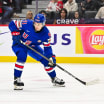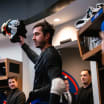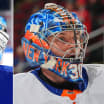Maven's Memories: Denis Potvin's Road to the Islanders
From Hull, Quebec to becoming a four-time Stanley Cup champion, Stan Fischler profiles Potvin's path to the NHL
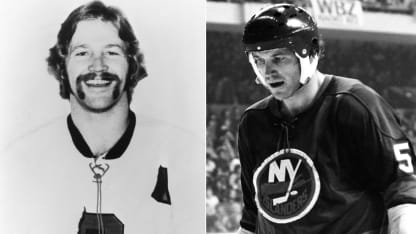
But not much of a stretch when one considers his beginnings in Hull, Quebec.
The French-speaking municipality across the river from Ottawa is where the fabulous Potvin Saga began, thanks to The Man of the house.
Denis' father, Armand, was NHL-bound when an injury derailed his career.
The elder Potvin vowed that he would do whatever possible to help his older sons -- Bob and Jean, plus Denis -- to chase their hockey dreams.
"Hockey was in my blood from the start," Denis remembers. "And that's the way my father wanted it."
Unfortunately, the Potvin's were on the poor side; so much so that Denis' first skates were hand-me-downs; from Armand to Bob and from Bob, finally, to Denis.
Fourth generation skates not only were dilapidated but poorly insulated against the bitter Hull cold. When Denis and I collaborated on his book, "Power On Ice," he explained the challenges he faced and conquered.
"To keep my feet warm in those ancient skates I'd sprinkle a lot of pepper inside the boot before I went outside to play," Denis said. "That would last for hours, and it always worked."
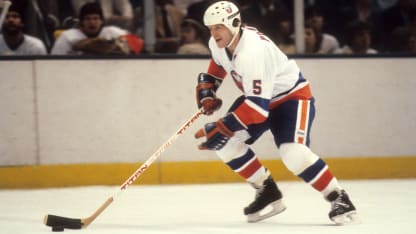
Before any kids game, Denis' ritual began with a search through the basement equipment box. Eventually he'd find shin pads -- they never matched -- and hockey pants that were held together with black tape.
It was a harsh fact of Potvin's life that Armand couldn't afford new equipment and Denis never asked for anything other than what was in the big, basement box.
"One Christmas," Denis recalled. "A new pair of Black Panther ice skates showed up under the tree and I suddenly became the happiest kid in all Canada."
Armand would flood a makeshift "rink" in the backyard where all three of the Potvin boys learned to stickhandle. Most of the time, Denis worked out with Jean who was four years older.
Oversized for his age -- and admittedly precocious -- Denis fit in with the "big guys" and never was demeaned by either of his big brothers.
Their mom, Lucille, was a strong woman who instilled courage in her offspring.
"If I got hurt," Denis said. "My mother would say, 'Denis, it's not the first time you've been bruised and it won't be the last. You're a big boy and, just remember, it's going to heal.'"
In a home where only French was spoken, the Potvin's obtained their Saturday night hockey from francophone play-by-play announcer Rene Lecavalier.
What "Hockey Night In Canada" was to Engish-speaking NHL fans, "La Soiree de Hockey" became a staple at Chez Potvin. Denis' idol on the Montreal Canadiens was majestic center Jean Beliveau.
Watching every game at home with his father, Denis would hope that Rene Lecavalier would shout, "Beliveau lance . . . ET COMPTE!." (Beliveau shoots and scores!).
The only issue Denis and his parents ever battled over was school. Mom and Dad Potvin emphatically wanted him to pursue the books; after all he was a smart cookie. Armand never forgot the injury that ended his career.
"You can never tell what's going to happen to you on the ice," Armand would warn Denis. "Look at me; one injury and I could never play pro again. Denis, it could happen to you, too."
"I kept thinking, hey, that can't happen to me," Potvin said. "It happens to other guys, but not me."
As he grew toward his teens, Denis' bond with his brother Jean tightened, especially when they were at the family's summer cottage on the Ottawa River, 20 miles from home.
On one occasion, young Denis actually "saved" Jean's life. It happened when his big brother had climbed a large, old tree, slipped and was plummeting head-first toward a large rock at the tree base.
"I instinctively held out my arms," Denis recalled, "And Jean plopped right into them. I held him for a split second; long enough to brake his fall and ensure his safety."
Jean and Denis got along famously despite the four years age difference. If there was any anxiety it was rooted in the Kid Brother's desire to impress Jean and even try to be his equal in hockey-playing.
But that would come later.
MAVEN'S MEMORIES
WRITTEN COVERAGE
Ziggy Palffy, Underrated Islanders Hero
Bill Torrey's Origin Story
The Heals and Flats Show
1993 Run Ends in Montreal
Unusual Draft of 1979
Isles Upset Pens in 1993
Prelude to Penguins Upset
Isles Beat Caps in 1993
1992-93 A Season to Remember
Maven's Haven
When Denis was eight-years-old and in fourth grade, he suffered an incident that he never forgot. Denis got in a fight with a high school kid who kayoed him with a haymaker.
When Armand heard about it, he summoned Denis for a heart-to-heart. The message was simple, don't go around starting a fight.
"But," added Papa Potvin. "If anyone ever starts up with you; no matter how big the guy may be, I never want you to back down from a battle. Never again!"
As Denis grew to the teenage level, his physique took on formidable proportions. At age 10, he was 5-foot-8 and 130 pounds. By the time he was 14, he weighed in at 185 pounds.
At that time, Denis was convinced that a pro hockey career was in his cards and his first in-person look with his dad at the Montreal Canadiens cemented his feelings about the ice game.
They attended an exhibition match at the old Ottawa Auditorium during which the NHL Canadiens faced off against their Junior team from Montreal.
"I was in Heaven watching the Habs," Denis said. "They had stars like Dickie Moore, Henri Richard, Jean Beliveau and Doug Harvey. I wanted very much to be like one of them."
The first rung on the ladder to the NHL for Potvin was on a very good Altavista team in Ottawa. While Brother Jean had made it with the Junior team in town, the Ottawa 67s, Denis continued to improve and finally got the call he wanted.
"I was all of 13 when the 67s coach, Bill Long, invited me to join his team," Denis said. "For my age, it was a bit of a gamble, but I played well enough to know I'd be invited back for the next season."
It also meant that Denis would have to forgo his other love, which was football. This was not an easy decision but when he was told that it either would be the gridiron or the ice, he decided to stay with the 67s.
He transferred the hitting thrills that excited him in football onto the ice. Soon, he turned into a crunching defenseman for Ottawa. Jean had become the elder statesman for the 67s and the undisputed defender of Denis.
"If someone took a run at me Jean would be right on the guy's back giving it to him," Potvin said. "It was very embarrassing at first because it looked as though I couldn't take care of myself.
"I realized he was doing it out of a sense of brotherliness," Potvin added. "So, I finally had to take him aside. I said, 'Hey, brother, let me fight my own battles."
Jean got the message and from then on, Denis would take on all challenges. His confidence grew as he mastered the art of an open-ice bodycheck and he neutralized some of the notorious OHA goons.
Denis Potvin had become a star and a story as well. Hockey writers zeroed in on him and many an encouraging words made it into the papers. Canadian Magazine author Earl McRae observed:
"It's obvious Potvin is something special. He's part of the play but then again he's not. He seems to transcend the action. His moves are so cool, so confident, never false.
"He rules all he surveys and there's no one to threaten his kingdom. He seldom completes a game without leaving a legacy of human destruction."
Being a junior superstar -- and that's what Denis was in his last season with the 67s -- it meant that he would be pursued both by agents as well as representatives of both the NHL and the new World Hockey Association.
By October 1972 -- the first season for the Islanders and Atlanta Flames -- the WHA boasted teams in such metropolitan as New York, Boston, Los Angeles and St. Paul. All of which had their eyes on Denis.
Montreal-based agents, David Schatia and Larry Sazant, became young Potvin's agents and asserted that the WHA was in the mix. On the NHL side, the Islanders -- who had finished last -- picked first in the 1973 Draft.
Already, he was being touted -- although he loathed the comparison -- as "The Next Bobby Orr." That was a natural media reaction simply based on Denis' fine play.
It wasn't the pressure that bothered the precocious junior star but rather because Denis was his own man. He had his own style, personality and goals which were far different from the Bobby Orr brand.
Potvin's point was underlined in an exhibition game between OHA players and the Moscow Selects. The Canadians were comprised mostly of the London Knights, but Denis and eight other juniors were added.
The OHA sextet won, 6-3, inspiring Frank Orr of the Toronto Star to write: "The poise and skill which Potvin displayed impressed the large number of NHL scouts on hand.
"They knew what he could do against boys, but they wanted to see him against men. He didn't disappoint them."
By now it was clear that the WHA's leaders -- they already had captured Bobby Hull for the 72-73 season among other NHL aces -- were hellbent to sign Denis. That meant that Isles' General Manager, Bill Torrey had to make a move; and fast.
On March 3, 1973, Bow Tie Bill obtained defenseman Jean Potvin from the Flyers in exchange for forward Terry Crisp. Denis was delighted, of course, but hinted broadly that it wouldn't guarantee his signing with the Isles.
"I had decided that I would go where I could get the most for my talents," said Potvin. "But in my heart I was hoping for the NHL, and specifically Jean and the Islanders."
In the end, the most intense competition facing Torrey was not from the WHA, but rather the Montreal Canadiens. Habs boss Sam Pollock already had a rep for fleecing foes and he tried again with the Isles GM. The 1973 Entry Draft was held in Montreal and of the 150 possible juniors, Denis was rated in the top. Pollock already had been badgering Bow Tie Bill with "packages" of players in exchange for the No. 1-pick.
Torrey put the nix on all offers right up until the moment NHL President Clarence Campbell signaled Torrey to make his selection.
Unexpectedly, Pollock raised his hand.
"Mister Campbell," he said, "May I interrupt for a moment to have a word with Mr. Torrey?"
While hundreds watched, Pollock crossed the room and chatted with Torrey for a half-minute. Finally, Sam returned to his seat while onlookers wondered whether a deal had been made.
"I didn't want to be traded," Potvin insisted. "I didn't want to play for the Canadiens because I was afraid that I'd be under tremendous pressure to be an instant superstar."
Denis' fears were vanquished when Campbell returned to the microphone and said, "Bill Torrey of the New York Islanders, you have the first choice."
And that's how the inimitable Potvin Era began in Uniondale, Long Island!

